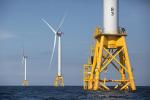The fishing industry is concerned construction of wind turbines on coastal waters is jeopardizing jobs and the fish population.
As governments pursue renewable energy sources with increasing demand for wind energy, the production of wind turbines is soaring. President Biden set a goal of reaching 30 gigawatts of offshore wind energy by 2030.
The offshore wind turbine market is projected to reach nearly $40 billion by the next decade, according to wind turbine operations and maintenance market research conducted by Transparency Market Research. The turbines convert wind into electricity, which is sent ashore through cables and fed into the regional or national electricity grid to power homes and businesses.
BOSTON METAL ACCEPTS A $120M INVESTMENT TO PRODUCE ‘GREEN STEEL’
However, as governments look to save the environment with alternatives to fossil fuel-based energy generation, fishermen tell FOX Business that they are the ones paying the price.
"Sitting these windmills in historic fishing grounds will torpedo the livelihoods of thousands of hardworking Americans and their coastal communities," Bonnie Brady, executive director of the Long Island Fishing Association, told FOX Business.
As major projects get underway, fishermen say they are being forced to take lengthier routes and navigate between turbines, which can be dangerous in bad weather conditions, raise fuel costs and also hinder catch totals.
They say problems exist even in spots where the turbines have yet to go up. Commercial fishermen, along with charter fishing boats, are seeing fish flee from the noise of the site surveys, only returning to regular spots a few days later.
ENERGY EXPERT URGES U.S. INDEPENDENCE, SAYS SECURITY MUST BE ‘BACK ON THE AGENDA’
"These boats are not stationary," Capt. Greg Cudnik of Fish Head Charters in Long Beach Island, New Jersey, told FOX Business. "Sometimes they have two or three working within a wind energy area, zigzagging up and down through the area, basically carpet bombing the ocean floor with sound."
Cudnik said that fish need to naturally migrate and spawn, and without that consistent process, the reproduction and viability of fisheries are in jeopardy.
It is not just the low-frequency radar noises from the survey boats that are disrupting the ecosystem. Cables and other construction needs are creating changes in the marine environment, which can be particularly harmful to bottom-feeding species like scallops, clams and flounder.
GET FOX BUSINESS ON THE GO BY CLICKING HERE
One former commercial scallop farmer in Islip, Long Island, said that all the cables and nets being placed into areas prime for harvesting are already disrupting the species. Since scallops cannot swim away and do not move quickly enough, the developments could decimate the multimillion-dollar fishery across the Atlantic seaboard.
After 30 years of harvesting more than 1.5 million scallops, Capt. Greg Kwaas, also an oceanography and marine biology teacher, is now fishing commercially for tuna. Even his new target catch is not immune to the changes spurred by the wind turbine developments and site surveying.
Kwaas relies on open waters to fish for tuna, which are a quick-moving species. The wind turbines out of the Long Island coast are bringing in new routes and blockages that are making his trips much lengthier.
All of that not only affects what fishermen catch and sell, but what families can find for dinner.
"Coastal communities overall stand to take a horrific hit economically as well as wild harvest food production," Brady said. "Who thought this was a good trade-off? Forget food, let’s do energy instead? You can’t eat energy."


